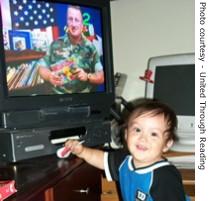2006年VOA标准英语-US Reading Program Honored as Exemplary Charity(在线收听)
By Mike O'Sullivan
Los Angeles
28 November 2006
A California charity is being praised for its efforts in helping U.S. military families. Family Literacy Foundation is linking military parents and their children through literature.

The charity based near San Diego uses technology to let moms and dads who are stationed overseas read books to their children at home.
Soldiers, sailors, Marines and airmen read stories to their youngsters that are recorded on DVD. The disks are sent home, where the children can watch them over and over.
Betty Mohlenbrock, founder and president of the Family Literacy Foundation, says the idea grew out her experience during the Vietnam War, when her husband was in the Navy, away from the family. "We were separated for 10 months. He was deployed, and we had a two-year-old [girl]. And when he returned, she did not recognize him," she said.
In 1989, she created a foundation to promote reading in the home, and started the military effort a 1 1/2 years later.
More than 140,000 families have been helped through the project, called United Through Reading. Mohlenbrock says it accomplishes two goals, helping families emotionally and offering children an early start in their education. "We believe that reading aloud to children is one of the best ways to communicate with them. And additionally, research states that it is the single best predictor of their future success in reading, if you read aloud to them regularly," she said.
The project was recently honored by the Drucker School of Management at Claremont Graduate University. The foundation received the Peter F. Drucker Award for non-profit innovation, which carries a cash prize of $25,000. The school's dean, Ira Jackson, says the award continues the tradition of management guru Peter Drucker, who died last year. Drucker was noted for his pioneering work in studying corporations, and was one of the first business professors to recognize the importance of the non-profit sector.
Jackson says that sector now includes 44,000 transnational NGOs, or non-government organizations. They focus on health, education, economic development and other needs and issues. "They are growing more rapidly than multinational corporations. There is an explosion of citizen action, of social entrepreneurship at the local level. In part, I think it is a reflection of the recognition that governments have their hands full just doing their day-to-day job, and civil society is too important to be left to the government," he said.
The United States has long been noted for its civic associations, and Jackson says the nation's one million charities represent between 10 and 20 percent of the U.S. economy. Many groups are small and are run by volunteers. The largest employ thousands. But management guru Peter Drucker said the best are highly efficient. He cited the Girl Scouts as an example.
The dean of the Drucker School says non-profit organizations are expanding in many places, and are an important component of any country's development.
"We need honest and efficient governments. We need a thriving private sector. And, perhaps most importantly, beyond the rule of law, we need the glue of a civil society, and a not-for-profit sector that is beholden to neither the government nor owned by business, which brings legitimacy to that society," he said.
He says the best charities, including the Family Literacy Foundation, can leverage limited resources and make a difference in people's lives. The San Diego group receives corporate donations, and works with the military, in its effort to build strong relationships between absent parents and their children.